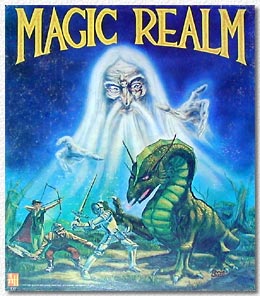
Avalon Hill, 1979
Although "Magic Realm" is sometimes viewed as the "Advanced Squad Leader" of Fantasy Games, it is probably not played as much as ASL, which actually still has a big fan base. Very often "MR" is on the receiving side of jokes, many consider it to be one of the big flops of Avalon Hill, and there are legendary stories about it's reception, like the university professor that wrote Avalon Hill that he was considered a person with a really high IQ and a successful scientist but STILL couldn't get the "Magic Realm" rules ...
Luding
Boardgamegeek
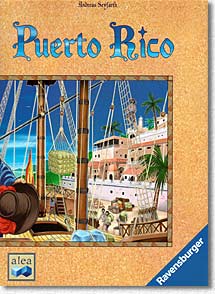
Alea, 2002
Considered by many to be the crowning achievement of Euro game design this game has everything that makes it a durable gem: 1) Many viable strategies that interlock in always interesting ways; 2) asymmetrical roles that players can take each round; 3) money management that makes you bite your nails; 4) beautiful game material, and 5) already proven durability. This is one of the games that can be the ideal gateway to Eurogames in general, as it shows perfectly what this medium can achieve. A classic.
Luding
Boardgamegeek
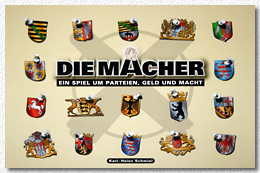
Hans im Glück, 1986/1997
How to describe "Die Macher" to the uninitiated? Well, imagine a game that makes even non-Germans develop a keen interest in the otherwise extremely boring German election system - people who hate statistics and percentages suddenly strive for parties they have never heard of in their life. The game is a realistic simulation on the one hand, a superb puzzle for gamer geeks on the other. Although completely abstract it is a totally engrossing, if not a little dry game. Let the "spin doctors" (a rough English translation of "Macher") rule forever!
Luding
Boardgamegeek
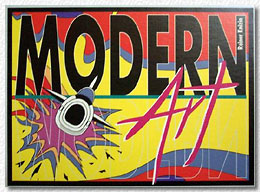
Hans im Glück, 1992
The durable quality of this game is that it has gained cult status DESPITE unusually ugly graphics. Players from all over the world face the eyesore cards and play the game regularly, so there must be something to it! It is simply a fascinating game, in which auctioning and the "stock market value" of paintings create a tense and challenging combo. It is not exactly an overlooked gem, but the Westpark Gamers would like to applaud one of the most long lasting and interesting German designs, and therefore also it's author, the inimitable Reiner Knizia!
Boardgamegeek
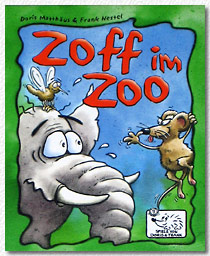
Spiele von Doris & Frank, 1999
This game is an absolute classic in the repertoire of the beautiful "Doris & Frank"-games. A real card-shark game, with appealing trick-taking mechanic that even surprises old cracks again and again. One has to definitely play the game as a series, otherwise you'll miss the team mechanic which works very well. The cuddly graphics by Doris Matthäus also contribute to making this game an evergreen in any game collection.
Boardgamegeek
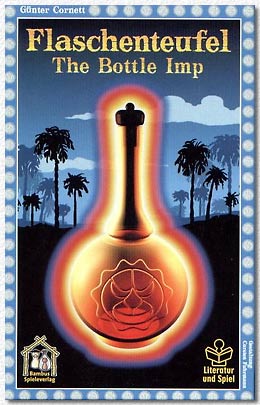
Bambus Spieleverlag, 1995
Günter Cornett hat ein grosses Talent für interessante Stichspiele mit einem besondern Clou, und "Flaschenteufel" ist keine Ausnahme. In diesem Spiel bekommt jeder einen Deal aus 36 Karten (nummeriert von 1-18 und 20-37) in 3 Farben. Der Stich wird von dem Spieler gewonnen, der die höchste Karte der selben Farbe (oder jeder Farbe, wenn er keine mehr in der Originalfarbe hat) spielt, die gleichzeitig die "höchste niedrigste" des laufenden "Flaschenteufels" ist, oder, wenn niemand unter dem Flaschenteifel gespielt hat, einfach die höchste Karte. Natürlich ist das nicht so einfach wie es klingt. Nun, es klingt noch nicht einmal einfach!
"Flaschenteufel" ist nicht nur ein sehr cleveres Spiel, sondern auch liebevoll nach einer Kurzgeschichte von Rudyard Kipling gestaltet, die - als besonderer Bonus - zweisprachig im Spiel enthalten ist. Kartenglück spielt sicherlich eine Rolle, denn wenn man viele niedrige Karten in seiner Anfangshand hat, mag es schwer sein, alle rechtzeitig loszuwerden. Dennoch handelt es sich hier um ein höchst vergnügliches Kartenspiel, das das Hirn beschäftigt und viele Quälmöglichkeiten der anderen Spieler bietet. Empfohlen!
Luding
Boardgamegeek
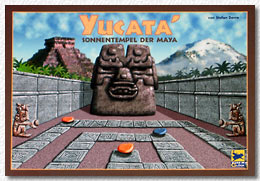
Hans im Glück, 1996
Yucata is a jolly cardgame along with a small board and coloured token stones, which are worth one special mentioning because of their aesthetic appearance. The players move by playing cards in the direction of the goal and try to pick up as many victory stones as possible, leaving the negative stones to their opponents. This is not easily achieved and many greedy stone collectors were crushed later by the burden of their negative stones acquired involuntarily.
Opinions about the game are far apart. For some it's only fun with three and more players, others believe it to be a brain teaser for exactly two players. Hence there's something in it for everyone: hard mental exercise for exactly two and jolly card fun for three to four fellows. Both categories are contained in the game at a high standard. Enough to become our "gem of the month".
Boardgamegeek
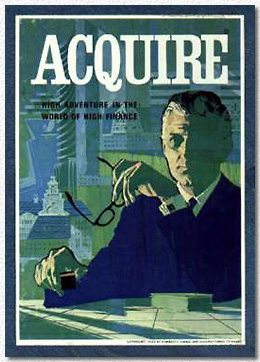
3M, 1962
Acquire is of course a "classic", not a gem in the strict sense (lately we have allowed to enter "classics" into this list as well as "gems"). And it has remained a classic that is played! Compared to some newer games this might now seem a little basic and dated, but strangely it's simplicity is part of it's appeal. There have been many discussions about the luck factor of the draw, but in my opinion this element creates good tension that gives the game a quasi relaxed character that makes it more of a family game than let's say "1830" (which has some similarities with "Acquire"). As this is one of the most influential games of all times it should be an essential part of any collection.
Luding
Boardgamegeek
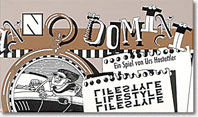
Fata Morgana/Abacus Spiele, 1998
"Anno Domini" has truly earned the title "gem", as it is regularly played in our group, mostly at the end of an evening of games. Based on a simple gaming system (a combination of bluffing and historical quiz game) it is equally enjoyed by the professional and the casual gamer, because it is quick to explain and very communicative. This is also a game which really thrives on expansion sets - there are countless variant sets on the wildest themes that are also relatively cheap to buy. The sheer amount of cards and their combinations is so immense that repetitions like in other quiz games almost never occur (and "Anno Domini" is not REALLY a quiz game - even the unknowing contestant can be succesful). Therefore it is our opinion that this game should be present in each collection!
Boardgamegeek
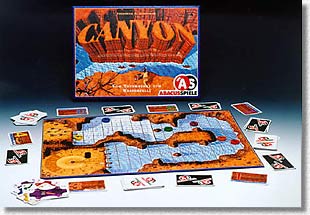
Abacus, 1999
There has been a flood of various trick taking card games in recent years, so it seems a good time to remind everyone of this "gem" by "Mick Ado" (Peter Gehrmann). "Grand Canyon" merges several interesting game mechanics, it is a combination of a) traditional card game (several trick-taking rounds, changing trumps) b) race game (the number of guessed tricks determines the movement rate) and c) character game (at the beginning of each round the players select character cards that have different special abilities, at least if you use the recommended expansion set). It doesn't hurt a lot that the native american theme seems slightly slapped on, as it fits the racing through narrow waterways. The combination of elements fully works, though, and because the game is played again and again in our group it definitely deserves the coveted title "gem of the month".
Boardgamegeek
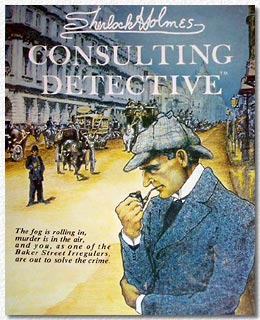
Sleuth Publications, 1981
Obviously, German "Games of the Year" have to be family games. That's why many of these games appear a bit simplistic to real hard-core gamers. In 1985 - when Gorbatchev became General Secretary and Boris Becker won Wimbledon - a rather unusual game received the award: Sherlock Holmes Criminal Cabinet, despite the English title a German translation of Sherlock Holmes Consulting Detective. The game principle of Sherlock Holmes comes close to a single-player fantasy roleplaying game ("You see a dragon in the rear. Do you want to attack, continue on p. 32. If you want to attempt to sneak past, continue reading on p.44"), however, it doesn't implement branches. Each section (called "clue"), corresponding to an address in London (e.g. the crime scene, the forensic institute, or the address of a suspect) is independent. You continue to read clues until you think you understand the case enough to answer the questions in the quizz book. A final score is calculated depending on how many clues you read and the number of correctly answered questions. The disadvantage of this game principle is obvious: a solved case is "used up" (unless, like we did, you rediscover the game after 20 years and for once enjoy your bad memory). The style of writing of the original game (yes, we played Consulting Detective) resembles that of Arthur Conan Doyle's. Most cases are designed well, some are a bit sloppy or far-fetched. But the same applies to Arthur Conan Doyle's novels, thus this also helps to recreate the proper atmosphere.
Boardgamegeek
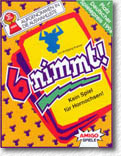
Amigo, 1994
This game just HAD to become GEM of the Month sooner or later, as it is one of our most played "end-of-session" games. For years (decades?) there are endless discussions if it is relevant if you select your cards at random or play them thoughtfully , there is even a total cult about the secret meaning of the "highest lowest card" that sometimes just HAS to be played. Only those who know this game know what we talk about out, there rarely ever was such a dichotomy between abstract theme and actual playing fun. This is a real evergreen that should be in all games collections!
Luding
Boardgamegeek
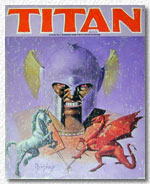
Avalon Hill, 1982
TITAN is not exactly an “overlooked” gem, to be honest. In fact it is THE legendary fantasy board game, highly sought after in collector’s circles, and truly beloved by it’s owners (I know of a gamer who actually keeps several unpunched versions of TITAN in his closet). The interesting thing is that there is truly no other game like TITAN. It is very abstract and very “real” at the same time, the combat mechanics are simple and extremely efficient, the graphic design is beautiful and unique. It also rewards skill more than other fantasy games...although many think it is luck-dominated at first glance it is not all so.
If there is one reason we want to point our finger at this wonderful game it is the simple fact that it is not available at the moment. On any fantasy game afficionado’s list this is THE number one game that should be published anew. Hasbro/Avalon Hill take note– PLEASE REPRINT THIS GAME!!!!!!!!
Boardgamegeek
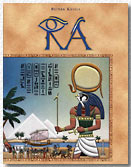
Alea, 1999
This month's "Gem of the month" comment is taken from a review of Gil Hova from boardgamegeek.com: "When asked what qualities he looked for in a good game, Sid Sackson once said, “It should be easy to learn yet have infinite strategic possibilities, give you the chance to make choices, create interaction among players, and take a maximum of one and a half hours to play.” I wonder if, somewhere in that huge collection of his, Sackson had a copy of Reiner Knizia’s auction game Ra. I wonder if he ever got the chance to play it. If he did, I’m sure he would have enjoyed it. Ra not only scores for all the conditions he named, but it manages to snag the ultimate intangible: Ra is one of the most fun games I’ve ever played." (Gil Hova)
Luding
Boardgamegeek
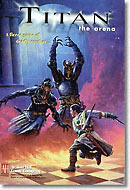
Avalon Hill, 1997
Already one of the most sought card games on ebay, this game has a very persistent history in our gaming group, getting very regular replay over the years since I introduced it first to the group eight years ago. For some reason the tinkering by Don Greenwood with the original by Knizia was the perfect combination: The game achieves the perfect balance of neither being too “German” and abstract nor too random or chaotic. The monsters have flair, the game moves at a quick pace and usually remains tense up to the end. There are many cries to republish this game, as it arrived at a point where AH was already nearly bankrupt so it couldn’t save the company. It looks like Fantasy Flight will produce a new version of it, although doubts remain as another “new” version (“Galaxy - the Arena” by GMT) didn’t fare too well....Let’s just hope the best and let us celebrate one of the best fantasy card games ever published: “Titan – The Arena”!
WPG Strategy Tips
Luding
Boardgamegeek
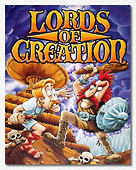
Warfrog, 1998
Luding
Boardgamegeek
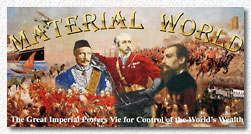
Strange Magic Games, 1995
Material World's clever game mechanics allow for two completely different strategies (the hare and the tortoise). The resulting multitude of game experiences increase its replay value significantly.
Unfortunately, the startplayer position is extremely important and military struggles seem a bit callow as the winner must feed the population of the vanquished without getting anything in return.
Luding
Boardgamegeek
